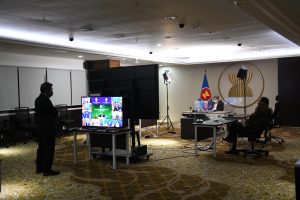Myanmar’s opposition shadow government yesterday welcomed the decision of the Association of Southeast Asian Nations (ASEAN) to exclude junta leader Min Aung Hlaing from its upcoming regional summit. At a “tense” emergency meeting on Friday night, ASEAN took the unusually bold step of uninviting the junta leader, and will instead invite a “non-political” representative from Myanmar to its October 26-28 summit.
Brunei, ASEAN’s current chair, issued a statement citing a lack of progress made on the Five-Point Consensus that ASEAN agreed with the junta at a special summit in Jakarta in April, stressing the corrosive impact the situation in Myanmar was having on regional security, “as well as the unity, credibility, and centrality of ASEAN.”
In a measured statement yesterday, the opposition National Unity Government (NUG) described ASEAN’s decision not to invite Min Aung Hlaing as “an unprecedented and positive step,” but said that the “non-political” figure who attends the summit must not be a representative of the junta in disguise.
“We urge the ASEAN to prevent not only the participation of SAC officials but also any individuals and organizations associated with them,” it stated. “We stand ready to provide recommendations for [a] non-political representative for ASEAN’s evaluation and consideration.”
In comments to Reuters, the NUG’s spokesperson Dr. Sasa went further, saying that the NUG, which was formed by members of the ousted civilian government in April, should be considered Myanmar’s legitimate representative to the summit. “ASEAN excluding Min Aung Hlaing is an important step, but we request that they recognize us as the proper representative,” he told the news agency.
At its April summit, ASEAN and the Myanmar junta agreed to a Five-Point Consensus that aimed to foster dialogue “among all parties” and pave the way toward a negotiated resolution of the country’s crisis. But almost immediately, the junta dragged its feet on the implementation of the consensus, while ASEAN has been internally divided as to how to respond.
The appointment of a special envoy, one of the five points of consensus, was only finalized in August. Even then, the envoy, Brunei’s Second Foreign Minister Erywan Yusof last week canceled his first official trip to the country after the junta announced that it would not grant him access to detained leader Aung San Suu Kyi.
While the outcome falls short of the full recognition that the NUG has long demanded, ASEAN’s decision to retract its invitation to Min Aung Hlaing reflects a tacit recognition that the legitimacy of Myanmar’s government is contested, and that the NUG has a credible claim. This has formed the basis for ASEAN’s decision to forego its controversial policy of “non-interference” in its member states’ internal affairs.
Who, if anyone, can be viewed as a genuinely “non-political” figure remains to be seen. But it is somewhat beside the point. As Aaron Connelly of Singapore’s International Institute for Strategic Studies noted yesterday, the formula was necessary for the exclusion of Min Aung Hlaing from the summit. Whoever ends up filling the role is less important than the fact that ASEAN has taken this step to begin with.
Unsurprisingly, Myanmar’s military administration was unmoved by ASEAN’s decision. A spokesperson for the junta blamed “foreign intervention” for the decision, while formal statement from the regime said that ASEAN’s decision was made “without consensus and was against the objectives of the ASEAN, the ASEAN Charter and its principles.”
In a televised speech yesterday, Min Aung Hlaing said that the Southeast Asian bloc should consider the provocations and violence being carried out by its opponents. “More violence happened due to provocations of terrorist groups,” the general said, according to Reuters. “No one cares about their violence, and is only demanding we solve the issue. ASEAN should work on that.” Min Aung Hlaing reiterated the junta’s own five-stage plan to restore “democracy.”
ASEAN’s decision, which followed threats from Malaysia’s foreign minister that Min Aung Hlaing could be excluded from the summit, is just the latest sign that the region’s leaders are running out of patience with the Myanmar junta after months of stonewalling.
The Southeast Asian bloc has been widely criticized for its feeble response to the February 1 coup, which tipped Myanmar into political turmoil and pushed the country to the brink of state collapse. As Singapore’s foreign ministry said in a statement on Saturday, the move to exclude junta chief Min Aung Hlaing was a “difficult, but necessary, decision to uphold ASEAN’s credibility.”
But much of the criticism of ASEAN, while well founded, has overlooked the wider question of whether the situation in Myanmar is amenable to any straightforward solution from the outside. The animosities between the two contending factions within Myanmar, neither of which has much interest in compromising with its opponent, suggests that ASEAN will have to go much further if it is to make an appreciable difference to the situation there. As the veteran Myanmar watcher Bertil Lintner wrote this week, “Myanmar is in turmoil, and there is very little ASEAN can do about it apart from symbolic summit snubs.”
































